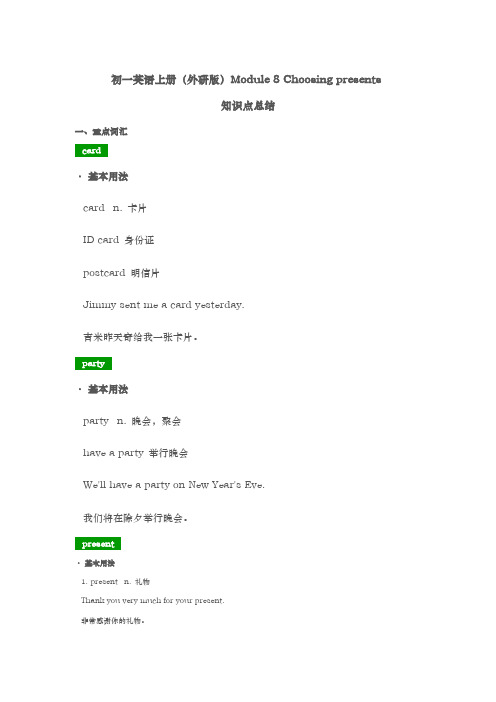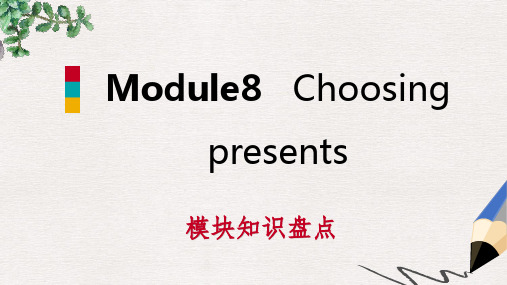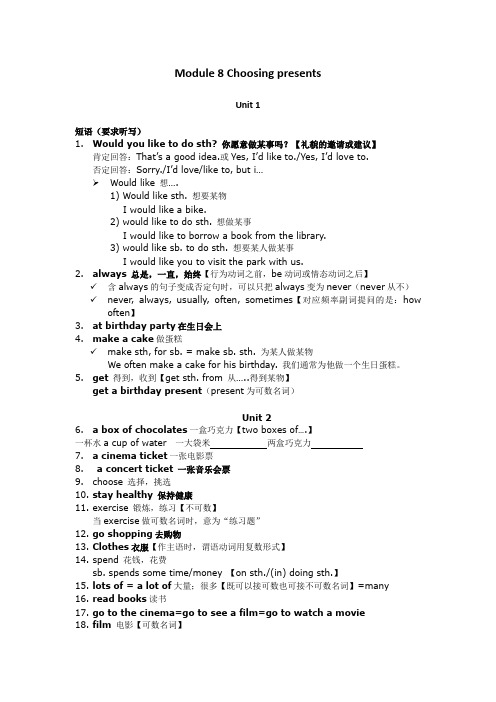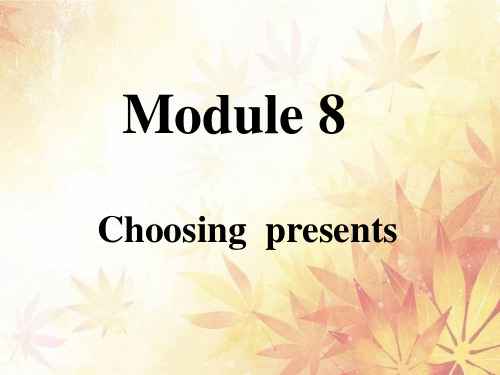外研社英语七年级 模块8 Choosing presents知识点 归纳
七年级英语(上册)(外研版)Module8Choosingpresents知识点总结

初一英语上册(外研版)Module 8 Choosing presents知识点总结一、重点词汇·基本用法card n. 卡片ID card 身份证postcard 明信片Jimmy sent me a card yesterday.吉米昨天寄给我一张卡片。
·基本用法party n. 晚会,聚会have a party 举行晚会We'll have a party on New Year's Eve.我们将在除夕举行晚会。
·基本用法1. present n. 礼物Thank you very much for your present.非常感谢你的礼物。
2. present adj. 出席的,在场的All the people present at the meeting agree to the plan.所有到会的人都同意这个计划。
·原文再现I always like birthday parties.我总是喜欢生日聚会。
·基本用法always adv. 总是,一直,通常位于行为动词之前,be动词或情态动词之后。
I always get everything ready before going out.我总是在出去之前把一切准备好。
She's always late for everything.她事事都迟到。
·知识拓展--相关单词用来表示频率的副词还有:usually 通常地often 经常地seldom 很少hardly 几乎不sometimes 有时never 从不·原文再现Great!太棒了!·基本用法great adj. 太好了,巨大的,很棒的What a great idea!好主意!This cake tastes great.这块蛋糕吃起来很不错。
·原文再现And we eat birthday cake too.并且我们也吃生日蛋糕。
七年级英语上册Module8Choosingpresents模块知识盘点课件新版外研版

模块知识盘点
Module8 Choosing presents
模块知识盘点
模块知识盘点
常用短语
1. at my house 在我家 2. at the birthday dinner 在生日晚宴上 3. make a birthday cake 制作一个生日蛋糕 4. at the party 在聚会上 5. get birthday presents 收到生日礼物 6. a box of chocolates 一盒巧克力
2019/5/26
最新中小学教学课件
11
谢谢欣赏!
2019/5/26你们用汉语,还是用英语唱?模块知识盘点
4. So what would you like for your birthday, Daming? 那么大明,你想要什么生日礼物呢?
5. Daming’s mother likes chocolate, but she doesn’t often buy any because it isn’t very healthy.大明的妈妈喜欢巧克力,但她不经常买, 因为它不是很健康。
编后语
做笔记不是要将所有东西都写下,我们需要的只是“详略得当“的笔记。做笔记究竟应该完整到什么程度,才能算详略得当呢?对此很难作出简单回答。 课堂笔记,最祥可逐字逐句,有言必录;最略则廖廖数笔,提纲挈领。做笔记的详略要依下面这些条件而定。
讲课内容——对实际材料的讲解课可能需要做大量的笔记。 最讲授的主题是否熟悉——越不熟悉的学科,笔记就越需要完整。 所讲授的知识材料在教科书或别的书刊上是否能够很容易看到——如果很难从别的来源得到这些知识,那么就必须做完整的笔记。 有的同学一味追求课堂笔记做得“漂亮”,把主要精力放在做笔记上,常常为看不清黑板上一个字或一句话,不断向四周同学询问。特意把笔记做得很
2016外研版七年级英语上册第八模块Module-8--Choosing-Presents-知识总结

Module 8 Choosing presentsUnit 1短语(要求听写)1.Would you like to do sth? 你愿意做某事吗?【礼貌的邀请或建议】肯定回答:That’s a good idea.或Yes, I’d like to./Yes, I’d love to.否定回答:Sorry./I’d love/like to, but i…Would like 想….1) Would like sth. 想要某物I would like a bike.2) would like to do sth. 想做某事I would like to borrow a book from the library.3) would like sb. to do sth. 想要某人做某事I would like you to visit the park with us.2.always 总是,一直,始终【行为动词之前,be动词或情态动词之后】✓含always的句子变成否定句时,可以只把always变为never(never从不)✓never, always, usually, often, sometimes【对应频率副词提问的是:how often】3.at birthday party在生日会上4.make a cake做蛋糕✓make sth, for sb. = make sb. sth. 为某人做某物We often make a cake for his birthday. 我们通常为他做一个生日蛋糕。
5.get 得到,收到【get sth. from 从…..得到某物】get a birthday present(present为可数名词)Unit 26. a box of chocolates一盒巧克力【two boxes of….】一杯水a cup of water 一大袋米两盒巧克力7. a cinema ticket一张电影票8. a concert ticket 一张音乐会票9.choose 选择,挑选10.stay healthy 保持健康11.exercise 锻炼,练习【不可数】当exercise做可数名词时,意为“练习题”12.go shopping去购物13.Clothes衣服【作主语时,谓语动词用复数形式】14.spend 花钱,花费sb. spends some time/money 【on sth./(in) doing sth.】15.lots of = a lot of大量;很多【既可以接可数也可接不可数名词】=many16.read books读书17.go to the cinema=go to see a film=go to watch a movie18.film 电影【可数名词】19.go to concerts去听音乐会20.match (尤指体育方面)比赛,竞赛【可数名词matches,观看比赛用watch】21.on television 通过电视上on以…..方式,通过on the radio, on the Internet, on the TV……22.at weekends 在周末【每个周末】23.like doing sth/like to do sthUnit 324.give sb. sth.=give sth to sb.给某人某物【代词只能用to的形式】25.She gives me a book. = She gives a book to me.on Saturday evening 星期六晚上【用on】26.24. Hear from…收到….的来信27.It’s great to hear from you Mike,but I’m afraid I can’t come.it is +adj.+for(of) sb. to do sth.I’m afraid(that)….恐怕….【I’m afraid …not….】I’m afraid I can’t help you.26.have a birthday party举行一个生日聚会关键句型1.---Would you like to come to my birthday party?---Yes, I’d love to.2.I always like birthday parties.3.What do you usually do at a Chinese birthday party?4.But my mother never makes a birthday cake.5.Daming’s grandparents like to stay healthy so every day they get someexercise in a park near their home.6.She spends a lot of money!7.They usually watch football on television at weekends.8.It’s great to hear from you Mike, but I’m afraid I can’t come.语法频度副词表示经常性或习惯性的行为时常可使用频度副词,常用的频度副词有:always(总是), often(经常),usually(通常),sometimes(有时),seldom(很少),never(从不) 频度副词在句中的位置是放在1. 行为动词之前,2.be动词之后,3. 在情态动词或助动词之后4. sometimes可放句首,句中或句末She is sometimes very busy.I can always remember you.We often go there.Sometimes she writes to me.= she writes to me sometimes.频度副词的用法:1.often,always,usually等通常和一般现在时连用,表示现在经常或反复发生的动作,2.always与现在进行时连用时,并不强调动作正在进行,而是表示赞叹,厌烦等情绪。
外研版七年级英语上册Module 8 Choosing presents 重点单词短语讲解(共35张PPT)

练习
________do you clean your room? --- Every day. A. How long B. How many C. How often D. How soon
频率副词的用法
• Often, always, usually等通常和一般现在时 连用,表示现在经常或反复发生的动作。
E.g. It often rains here in April. • Always 与进行时连用时,并不强调动作正
在进行,而是表示赞叹、厌烦等情绪。
E.g. He is always thinking of others. • 对这些频度副词提问时,用how often E.g. He never plays computer games. How often does he play computer games?
Hear v.听
e.g. It’s great to hear from you, Mike. 迈克,收到你的邮件太好了。
Hear v.听见 e.g. Can you hear me?=get a letter from Hear from 收到……的来信 e.g. He often hears from his friends.
Choose v.选择
e.g. Choose birthday presents. 挑选礼物。
Exercise v.练习
e.g. They get some exercise in a park. 他们在他们公园里锻炼。
n.练习题 e.g. Our maths teacher often asks
us to do many exercises.
Wear v.穿
外研版七年级上英语英语《Module8,ChoosingpresentsUnit1》说课稿

外研版七年级上英语英语《Module 8,Choosing presents Unit 1》说课稿一. 教材分析外研版七年级上英语《Module 8, Choosing presents Unit 1》的主要内容包括:学会如何根据场合和人物选择合适的礼物。
通过本节课的学习,学生能够掌握相关词汇和表达方式,如:birthday, Christmas, present, why not, what about等。
同时,学生还能够学会如何用英语进行简单的购物交流。
本节课的主要语言功能是:询问和推荐礼物,表达个人喜好和意见。
二. 学情分析针对七年级的学生,他们已经掌握了一定的英语基础知识,具备一定的听、说、读、写能力。
但他们在实际运用英语进行交流时,还存在着一定的困难。
因此,在教学过程中,教师需要关注学生的个体差异,因材施教,引导他们积极参与课堂活动,提高他们的英语实际应用能力。
三. 说教学目标1.知识目标:学生能够掌握本节课的主要词汇和表达方式,如:birthday, Christmas, present, why not, what about等。
2.能力目标:学生能够用英语进行简单的购物交流,学会询问和推荐礼物,表达个人喜好和意见。
3.情感目标:通过本节课的学习,学生能够培养关爱他人,关注他人需求的良好品质。
四. 说教学重难点1.重点:学生能够掌握本节课的主要词汇和表达方式,如:birthday,Christmas, present, why not, what about等。
2.难点:学生能够用英语进行简单的购物交流,学会询问和推荐礼物,表达个人喜好和意见。
五. 说教学方法与手段本节课采用任务型教学法,通过设定各种真实的购物场景,让学生在实践中学习英语,提高他们的听、说、读、写能力。
同时,运用多媒体教学手段,如:PPT、视频等,为学生提供丰富的学习资源,激发他们的学习兴趣。
六. 说教学过程1.导入:教师通过展示各种礼物图片,引导学生谈论他们最喜欢的礼物,从而引入本节课的主题。
外研版七年级上册Module 8 Choosing presents Unit 2 She often goes to concerts.

Learning to learn
In English we often use two words for
one idea or things: cinema ticket,
concert ticket, football match, tennis
match. When you write them down,
What …often do at wendends?
get some exercise go shopping
go to the cinema
go to concerts
Watch football matches on television
Fast reading
Daming’s grandparents
scarf-scarves
many+可数n复数.
a lot of/lots of much+不可数 n.
leaf-leaves
Para.3&4 Listen and fill in reading Betty’s cousin likes _______ and she reads lots of books and magazines. She also likes films cinema ______ and often goes to the _______, but she never watches sport. Tony’s sister likes music. She likes going to concerts but it’s often expensive. She buys CDs of her favourite songs.
Para.2 Read and fill in Daming’s mother likes chocolate, but she doesn’t often buy any because it isn’t very _________. She likes ______________ and healthy going shopping always buys __________clothes. She has got expensive 11_______________, 20 dresses and a lot of silk scarves shoes _______. She spends a lot of money.
外研版七上Module8 Choosing presents基础知识大归纳
外研版Module8 Choosing presents基础知识大归纳一.短语归纳1.一个生日派对a birthday party2.制作蛋糕make cakes3.保持健康keep healthy/stay healthy4.去购物go shopping5.去看电影go to the cinema6.去听音乐会go to concerts7.在电视上(1)on TV(2)on television8.在周末(1)at weekends(2)on weekends9.在周六晚上on Saturday evening10.收到......的来信(1)hear from(2)get a letter from11.教师节Teachers’Day12.锻炼get some exercise13.一个特殊的生日礼物a special birthday present14.在派对上at the party15.用中文in Chinese16.昂贵的衣服expensive clothes二.用法归纳17.想要做某事(1)would like to do sth.(2)want to do sth.18.你想要的做某事吗?(1)Would you like to do sth.?(2)Do you want to do sth.?19.给某人某物(1)give sb. sth(2)give sth. to sb.20.喜欢做某事like doing sth.21.做某事是......的It is+形容词+to do sth.【例句】It is important to learn English well.22.对于某人来说做某事是......的It is+形容词+for sb.to do sth. 【例句】It is important for us to learn English well.23.恐怕......I’m afraid that...24.观看某人做某事watch sb. do sth.25.Let+sb.(宾格)+do sth. 让某人做某事26.人+spend+时间/金钱+doing sth.【例句】(1)My mother spends one week reading this book.(2)My mother spends 10 yuan buying this book.27.人+spend+时间/金钱+on sth.【例句】(1)My mother spends one week on this book.(2)My mother spends 10 yuan on this book.28.害怕做某事be afraid of doing sth29.害怕做某事be afraid to do sth。
外研版英语(新标准)七年级上册Module 8 Choosing presents模块知识点归纳总结
Module 8 Choosing presentsI always like birthday parties.必背单词1.party(n.)晚会,聚会→parties(pl.)2.special(adj.)特别的,特殊的→specially(adv.)特别地3.sing(v.)唱,唱歌→singer(n.)歌手4.happy(adj.)高兴的,幸福的→happily(adv.)高兴地,快乐地5.card(n.)卡片6.present(n.)礼物7.would(v.aux.)肯,会;愿意8.always(adv.)总是;一直9.great(adj.)太好了;巨大的;超乎寻常的10.never(adv.)从不11.cut(v.) 切;剪12.give(v.)给,送13.secret(n.)秘密必背短语14.make a birthday cake 做一个生日蛋糕15.Teachers' Day 教师节必背句子16.—Would you like to come to my birthday party?你愿意来参加我的生日聚会吗?—Yes, I'd love to. 是的,我愿意。
17.What do you usually do at a Chinese birthday party?在中国的生日派对上,你们通常做什么?18.And we sometimes give birthday cards.并且我们有时赠送生日卡片。
19.Do you sing it in Chinese or in English?你们用中文还是英文唱?She often goes to concerts.必背单词1.scarf(n.)围巾→scarves(pl.)2.dress(n.)连衣裙;礼服→dresses(pl.)3.wear(v.)穿,戴(表状态)→put on(表动作)4.expensive(adj.)昂贵的→cheap(反义词)便宜的5.match(n.)(尤指体育方面的)比赛,竞赛→matches(pl.) 6.concert(n.)音乐会7.song(n.)歌曲8.film(n.)电影9.magazine(n.)杂志10.silk(n.)丝绸11.Tshirt(n.)T恤衫12.shoe(n.)鞋,鞋子13.choose(v.)选择,挑选必背短语14.at weekends在周末15.go to the cinema去看电影16.go shopping去购物17.get some exercise做运动18.buy expensive clothes买昂贵的衣服必背句子19.Daming's grandparents like to stay healthy...大明的祖父母想要保持健康……20.She spends a lot of money.她花了许多钱。
外研社七年级上英语英语《Module8,Choosingpresents》说课稿
外研社七年级上英语英语《Module 8,Choosing presents》说课稿一. 教材分析外研社七年级上英语《Module 8, Choosing presents》是本模块的第一单元,主题是“选择礼物”。
本课的内容包括如何根据场合和人物选择合适的礼物。
教材通过丰富的情景对话和练习,帮助学生掌握相关词汇和表达方式,提高他们的口语交际能力。
二. 学情分析七年级的学生已经掌握了一些基本的英语语法和词汇,具备一定的口语交际能力。
但他们在实际运用中,尤其在选择礼物这一方面,可能还缺乏相关的文化和语境意识。
因此,在教学过程中,我将会注重培养学生的文化素养和语境意识,提高他们的实际应用能力。
三. 说教学目标1.知识目标:学生能够掌握本课中的相关词汇和表达方式,理解如何根据场合和人物选择礼物。
2.能力目标:学生能够在实际情境中运用所学知识,提高他们的口语交际能力。
3.情感目标:学生能够了解西方的送礼习惯,培养他们的跨文化交际意识。
四. 说教学重难点1.重点:学生能够掌握本课中的相关词汇和表达方式,理解如何根据场合和人物选择礼物。
2.难点:学生能够在实际情境中灵活运用所学知识,提高他们的口语交际能力。
五. 说教学方法与手段1.交际法:通过情景对话,让学生在实际语境中学习并运用所学知识。
2.任务型教学法:通过完成各种任务,激发学生的学习兴趣,提高他们的实践能力。
3.信息技术辅助教学:利用多媒体课件和网络资源,丰富教学手段,提高教学效果。
六. 说教学过程1.导入:通过提问学生喜欢的礼物和送礼物的经历,激发学生的学习兴趣,引入本课主题。
2.新课呈现:通过情景对话,让学生了解如何根据场合和人物选择礼物。
3.操练环节:学生分角色扮演,模仿对话,巩固所学知识。
4.任务型活动:学生分组讨论,根据不同的场合和人物,设计合适的礼物方案。
5.输出环节:学生展示自己的礼物方案,大家共同评价,提高口语交际能力。
6.总结:对本课内容进行总结,强调如何根据场合和人物选择礼物。
外研英语七年级上Module8重要词句讲解 习题 有答案
Unit 8 Choosing presents课内基础必背词汇card [kɑ:d] n. 卡片party ['pɑ:ti] n. 晚会;聚会present ['prezənt] n. 礼物always ['ɔ:lweiz] adv. 一直;总是great [ɡreit] adj. 巨大的;太好了;超乎寻常的cake [keik] n. 蛋糕never ['nevə] adv. 从不special ['speʃəl] adj. 特别的;特殊的cut [kʌt] vt. 切;剪give [ɡiv] vt. 给;送sing [siŋ] vt. 唱;唱歌happy ['hæpi] adj. 幸福的;高兴的secret ['si:krit] n. 秘密concert [kən'sət] n. 音乐会magazine [,mæɡə'zi:n] n. 杂志scarf [skɑ:f] n. 围巾silk [silk] n. 丝绸dress [dres] n. 连衣裙;礼服T-shirt ['ti,ʃɝt] n. T恤衫choose [tʃu:z] vi. 选择,挑选exercise ['eksəsaiz] n. 锻炼;练习wear [wεə] v. 穿;戴expensive [ik'spensiv] adj. 昂贵的shoe [ʃu:] n. 鞋,鞋子spend [spend] vi. 花钱;花费money ['mʌni] n. 钱;金钱film [film] n. 电影song [sɔŋ] n. 歌曲match [mætʃ] n. 比赛,竞赛weekend [,wi:k'end] n. 周末dear [diə] adj. 亲爱的(用于信开头某人的名字前)hear [hiə] vi. 听见afraid [ə'freid] adj. 害怕的;担心的必背短语1. would like 想要2. in China 在中国3. in English 用英语说4. go to the cinema 去看电影5. on television 在电视上6. at weekends 在周末7. hear from 收到某人消息经典句型1. Hi, would you like to come to my birthday party?嗨,你会来我的生日派对吗?2. I always like birthday parties.我一直很喜欢生日派对。
- 1、下载文档前请自行甄别文档内容的完整性,平台不提供额外的编辑、内容补充、找答案等附加服务。
- 2、"仅部分预览"的文档,不可在线预览部分如存在完整性等问题,可反馈申请退款(可完整预览的文档不适用该条件!)。
- 3、如文档侵犯您的权益,请联系客服反馈,我们会尽快为您处理(人工客服工作时间:9:00-18:30)。
外研社七年级英语模块8 Choosing presents 知识点归纳知识点一:模块8短语1.have a birthday party for sb.为某人举行生日聚会2.go to one’s birthday party去参加某人的生日聚会3.at the birthday dinner在生日晚宴上4.make a birday cake for sb为某人制作生日蛋糕5.give/send birthday cards 送生日卡片6.get birthday presents 收到生日礼物7.on one’s birthday在某人生日那天8. a box of chocolates 一盒巧克力9. a cinema ticket 一张电影票10. a concert ticket一张音乐会入场券11.choose a birthday present for... 为…选生日礼物12.stay/keep healthy 保持健康13.get /take/do some exercise 锻炼14.eleven silk scarves 11条丝巾15.sb spend +时间/钱+on sth在某物上花费时间/钱16.read magazines 阅读杂志17.read books 看书18.go to the cinema 去看电影19.see a film 看电影20.watch sports 观看体育赛事21.go to concerts 去听音乐会22.the CDs of one’s favourite songs某人最喜爱歌曲的唱片23.go to the football match 去看足球赛24.watch football matches on TV在电视里看足球比赛25.at weekends = at the weekend 在周末26.stay at home 呆在家27.on Saturday evening 在星期六晚上28.hear from sb. 收到某人的来信29.watch sb. do sth. 观看某做某事30.go shopping 去购物31.at once 立刻,马上buy sb. sth. = buy sth. for sb. 为某人买某物知识点二:重点词语解释unit one1.—Would you like to come to my birthday party?你愿意来参加我的生日聚会吗?—Yes, I’d love to.是的,我愿意。
Would you like…? 常用来向对方提出有礼貌地请求、邀请等,意为“你(们) 想要/ 愿意……吗?”其肯定回答多用Yes, please. / Yes, I’d love to.等, 否定回答多用No, thanks. / I’d like to, but I have to …等。
2. She never wears jeans or trainers.她从不穿牛仔裤或软运动鞋。
never用于行为动词之前,构成否定句。
3. We sometimes give birthday cards.我们有时候给生日贺卡。
give sb sth或give sth to sb, 意为“给某人某物”。
4. My mother never makes a birthday cake.我的妈妈从不做生日蛋糕。
make sb sth表示“给某人制作某物”,相当于make sth for sb。
有类似用法的动词还有buy等。
如:I want to buy my brother a T-shirt. = I want to buy a T-shirt for my brother.unit two1. She spends a lot of money.她花了很多钱。
spend作动词,意为“花(钱),花费(时间)”,一般用表示人的名词作主语。
常见用法有:★spend + 名词花(费)……★spend + 时间/ 金钱+ on sth在……上花费时间/ 金钱★spend + 时间/ 金钱+ (in) doing sth花费时间/ 金钱做某事2. She also likes films and often goes to the cinema.她也喜欢电影,经常去电影院.go to the cinema 意为“去看电影”。
类似的短语还有:concerts 去听音乐会football match 去看足球比赛basketball matches 去看篮球比赛3. She has got 11 silk scarves, 20 shirts and a lot of shoes.在英语中,有些名词表示由两部分构成该事物的名词。
做主语时谓语动词要用复数,表示数量时常与“数词+ pair(s) + of”搭配。
如:shoes鞋trousers 裤子glasses 眼镜gloves手套shorts短裤scissors剪刀chopsticks筷子That pair of trousers is Tony’s. 那条裤子是托尼的。
Scissors are used to cut things. 剪刀是用来剪东西的。
Unit 3本模块有几个表示不确定时间的副词:always(总是),often(经常),usually(通常),sometimes (有时),seldom(很少),never(从不)等,这些副词表频度,表示经常性或习惯性的行为。
在句中位置:在be动词,情态动词或助动词之后,行为动词之前。
按频率大小排列:always > usually > often > sometimes > seldom > neveralways是频度最大的词,意为“总是;永远”。
I always remember my first day at school.我将永远记住我上学的第一天。
usuall y意为“通常”,即很少例外,频度仅次于always。
What do you usually have for breakfast?你通常早餐吃什么?often意为“经常”,在频度上不如usually那么频繁。
Li Ping often does his homework in the afternoon.李平经常在下午做作业。
sometimes意为“有时候”,频度比often小,表示动作偶尔发生,间断较大。
既可以放在be动词、助动词之后,行为动词之前,也可以放在句首,还可以放在句尾。
I sometimes go to the library.我有时去图书馆。
Sometimes I read a book in the evening. 我有时在晚上看书。
never从未;永不;决不。
I have never been there. 我从未到过那里。
知识点三:语法归纳:一般现在时(四)1.一般现在时表示经常性或者习惯性的行为时,常常使用频率副词。
常用的频率副词有:always (总是),often(经常),usually(通常),sometimes(有时),seldom(很少),never(从不)。
eg: The student often plays basketball at school.那个学生经常在学校打篮球。
My friends always help me with my Chinese.我的朋友们一直帮我学中文。
Sometimes Jim plays the piano after lunch.吉姆有时候在午餐后弹钢琴。
(1)频度副词在句中的位置:在be动词之后。
go toeg: She is sometimes very busy.她有时很忙。
②在助动词或情态动词之后。
eg:I can always remember you.我总能记住你。
③在行为动词之前。
eg:We often go there.我们经常去那里。
④sometimes 可放在句首、句中或者句末。
eg: Sometimes she writes to me.=She writes to me sometimes.她有时给我写信(2)对这些频度副词提问时,用how often.eg:He never plays computer games.他从不玩电脑游戏。
→ How often does he pl ay computer games?他多久玩一次电脑游戏?2.一般现在时也与类似every day, in the morning, on Sunday, at eigt o’clock等具有周期性的时间状语连用。
eg: We get up at 6:00 in the morning.我们早上6点钟起床。
I watch TV every day. 我每天看电视。
3.一般现在时还用来表示某人或某物现阶段的特征、性质、能力以及显示社会和自然界中的客观现象,包括真理等内容时。
eg: The girl is beautiful. She works in a shop.那个女孩很漂亮。
她在一家商店工作。
Pandas live in Sichuan. They eat bamboo leaves.大熊猫住在四川。
它们吃竹叶。
